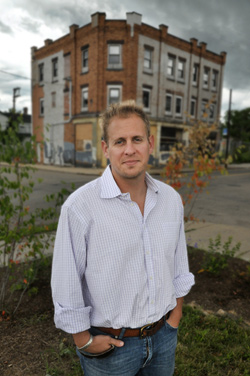 Andrew Butcher, 30, co-founded GTECH, one of Pittsburgh’s premier green economy initiatives, along with his partner, Chris Koch. The nonprofit aims to help Pittsburgh grow by transforming vacant land, connecting people to the green economy, and using green strategies to provide economic and community development opportunities. Its CEO is equally passionate about green solutions, Pittsburgh’s prospects and his neighborhood cafes.
Andrew Butcher, 30, co-founded GTECH, one of Pittsburgh’s premier green economy initiatives, along with his partner, Chris Koch. The nonprofit aims to help Pittsburgh grow by transforming vacant land, connecting people to the green economy, and using green strategies to provide economic and community development opportunities. Its CEO is equally passionate about green solutions, Pittsburgh’s prospects and his neighborhood cafes.
What is GTECH working on these days?
We have an ongoing vacant land redevelopment project. We work with community partners and cultivate sunflowers as a biofuel crop, and most importantly, as a transitional green strategy. Sunflowers can be grown on vacant land to improve soil, to get people involved in the process, and to transition vacant land into a community asset, such as a playground or a park.
We are also piloting a large-scale corridor project, SPARC. We are collaborating with seven environment and community organizations, including East Liberty Development Inc. and Larimer Consensus Group to reclaim vacant land in the Larimer Avenue Corridor (linking the East Liberty and Larimer neighborhoods).
Another project, ReFuel Pgh, aims to collect waste cooking oil from restaurants and churches and other entities. We sell the oil to Fossil Free Fuel, a Braddock company. These and other activities are ways of transitioning environmental liabilities into possible community assets.
How does the alternative energy sector in Pittsburgh compare to Colorado, where you once lived?
In Colorado, alternative energy is booming. I’m intrigued by the industry in Pittsburgh, where it’s growing.
From a personal standpoint, it’s the most exciting place because of potential growth and potential to create new resources of value. There’s a lot of opportunity for growth, and inspiring organizations are taking root here. It’s exciting to contribute to that growth.
You were recently invited to participate in a German Marshal funded trip to Leipzig, Germany and Manchester, England. What kinds of ideas were exchanged that might benefit this region?
It was an honor to be invited (along with a handful of representatives from U.S. cities in transition). Europe has been ahead of the curve in incentivizing renewable energy to spur innovation and cultivate new markets. It was interesting to see the spill-over effect.
Policy-makers in Germany don’t question the value of investing in alternative energy. Sometimes it feels like we still have to justify investments in renewable energy. While there, I had an aha! moment about our tremendous asset in land. The efforts of increasing green space will result in longer term, more sustainable redevelopment. This might seem obvious, but it became clearer to me abroad.
You earned your master’s from CMU. What led you to stay and start GTECH in Pittsburgh?
GTECH was a direct spin-off of my research at Carnegie Mellon. What made me want to stay was the possibility of making bold changes. Pittsburgh has a culture that embraces entrepreneurship. I was able to translate my academic learning into an actual business.
What drew you to the neighborhood of Regent Square?
When we decided to stay in Pittsburgh, we said we wanted to live in walking distance to a good park and to a good coffee shop. We found that in Regent Square. Every morning I let my dog out, have a cup of coffee and think wow, Pittsburgh. I love it here.
What’s your favorite breakfast spot?
You can’t live in Regent Square and not say the Square Cafe.
What’s your ideal night in Pittsburgh?
A sunset kayak with a cold Gale’s Pale Ale, followed by a backyard barbecue with friends and an intense ladder golf match, followed by a backyard bonfire.
What do you consider your most memorable personal achievement?
GTECH is four years old. We employ 9.5 people. We just invested in office space in a transitional community. We’ve received national attention and are helping to elevate some of Pittsburgh’s profile. I’m incredibly proud to be doing what I’m doing and I’m working with incredible people. My wife, (Julie Butcher Pezzino, Grow Pittsburgh‘s executive director) is an incredible influence.
And your motto?
I come from a big family, with five older sisters. I learned some pretty important lessons from that. First, to always assume that everyone knows more than me. Also, that it’s incredibly important to listen. Next, I try to bring that humility and attention to inquiry to everything. Lastly, I think I have a healthy level of impatience. The time to be proactive, to find solutions, is now.
If you could change one thing about Pittsburgh, what would it be?
We need a willingness to let go of the past and trust in the future. And a good burrito shop.
Read more about GTECH’s newest venture in Pop City’s development news section.
Photographs copyright Brian Cohen


